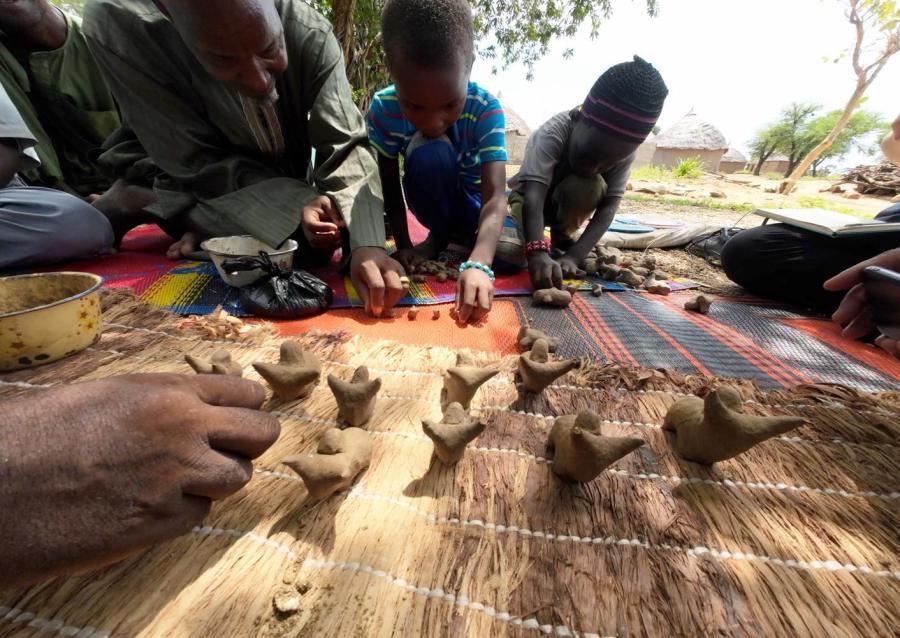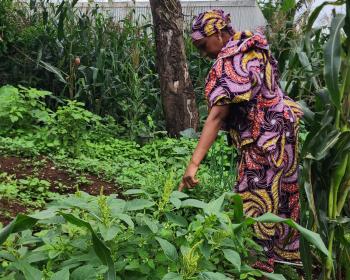
Cameroonian environmental defender Nasako Besingi has support of local and international communities, despite a controversial conviction by local Cameroonian courts on charges of defamation against a US agri-business company Herakles Farms and it’s local subsidiary, SG-SOC Global.
Nasako Besingi is the director of the organization SEFE (Struggle to Economize Future Environment) which has been fighting alongside local communities to protect ancient rainforests of southwestern Cameroon from plans for a massive palm oil plantation. Since 2010, U.S. investors Herakles Farms have repeatedly violated communities’ rights to give Free, Prior and Informed Consent as they moved forward with clear cutting rainforests that communities have traditionally used for small scale agriculture and foraging.
Farmers and activists in Cameroon say the sentence sends a dangerous signal to communities trying to protect their land and resources.
Nasako says his NGO has paid the fine “Just to have time to do other things while our lawyer Adolf Malle follows up an appeal at the southwest regional Court of Appeal.”
Recounting his plight to Inter Press Service, he said Herakles Farms sued him following government’s suspension of its activities. He also revealed to IPS he had written petitions against the company in which he accused its officials of lying to villagers.
In his complaints, he notified the government of the company’s activities, clearing, felling trees and planting nurseries despite lacking confirmed authorization to do so. He had also reported claims by Herakles Farms that it had authorization to acquire 73,000 hectares of land on a 99 year-lease at the cost at about 50 cents per hectare per year. “My complaint was filed in August 2012 and in November 2013, President Paul Biya signed a decree, limiting the company to 19,843 hectares of land in Cameroon and to pay seven dollars per hectare per year.” The company later abandoned the project.
Nasako led journalists from both the local and international media to cover conflicts between Herakles Farms (SG-SOC) and communities of the Mundemba sub-division in the southwest of Cameroon. He was attacked in the forest a few days later on his way to an interior village in the subdivision for a sensitization campaign. In his report of the incident he identified the attackers as workers of his company.
“They used the report against me claiming I defamed the company, whereas there were many witnesses at the scene of the event,” Nasako said. “I filed a complaint in court against the company, but they too filed one at the same time and for some reasons, the court decided to listen to the multinational firm.”
A coalition of national and international organizations have denounced Cameroonian authorities’ repression and harassment of Besingi, as well as the harmful environmental and social impacts that the palm oil plantation would have on local communities. Nasako told IPS that he is comforted by officials of local and international NGOs including Nature Cameroon, Cultural Survival, the African Coalition Against Land Grabbing, Green Peace among other sympathizers.
To Samuel Nguiffo, Coordinator of the Yaounde-based Center for Environment and Development, CED, “The conviction of Nasako Besingi, which follows a series of other procedures, suggests a desire to intimidate environmental activists, in a context marked by the proliferation of investments in land and natural resources, which strongly encroach on village land.”
A statement from the Amy Moas, a US-based Senior Forest Campaigner and Eric Ini, an Africa Forest Campaigner for Green Peace, says Nasako is “Guilty for nothing more than exercising his democratic right to protest.” They hold that Herakles Farms has consistently worked to silence its critics and that the activist has been intimidated and assaulted in recent years.
In interviews with IPS, many local tribal chiefs and villagers also lent their support to Nasako:
Chief Alexander Ekperi of Esoki, one of the villages affected by the Herakles agro-industrial project told IPS that as a traditional ruler, he was a middleman between the investors and the indigenes. He said his people depend on farming and without land they will be idle and poor.
“I am 100 per cent in support of Nasako. The company concealed information from us. We were fooled our village will be developed but Nasako and other environmentalist educated us on the project and we realized the company was going to exploit both timber and non-timber products, grab our farmland and leave people stranded. We were not even aware of how much land the company was grabbing,” he said.
The traditional ruler complained, “Even our people, like Dr. Blaise Mekole who were close to the investors have vanished and no longer communicate with us. People are looking up to me to pay for some work they did for the company, whereas I was given a fake ECOBANK cheque. It was a mafia (incident) and we regret the person who exposed it is getting a heavy sentence.”
Peter Okpo Wa-namolongo who lives in one of the villages in the Korup National Park, believes Nasako’s verdict was unjust. “I don’t know if some of our elite are truly Cameroonians, because when it comes to money, they don’t feel for their own people. The investors give us oil, food and beer and pay the elite huge amounts of bribe money for our land,” he said.
Wa-namolongo pointed out, “These big companies have money. They pay their way into places and I’m sure even the judges received their money. I am strongly against what is happening to Nasako.”
Mosembe Cornelius, owner of a vast farmland that was coveted by Harakles farms told IPS that “The main problem is that government has incomplete information about the crisis. I would have lost my own seven hectares if environmentalists were not here to help.”
Before Mosember could finish his statement, another villager, Edwin Njio joined in and said, “Environmentalists helped us meet international lawyers who exposed the illegality of the company. We would be dead without our land. We the villagers are very angry.”
He also said, “We were treated as animals but we now understand our rights. If Nasako is convicted then the whole of Cameroon should be jailed. Even our chiefs (traditional rulers) treated us as if we don’t deserve respect.”
Nasako’s case is currently under appeal.



